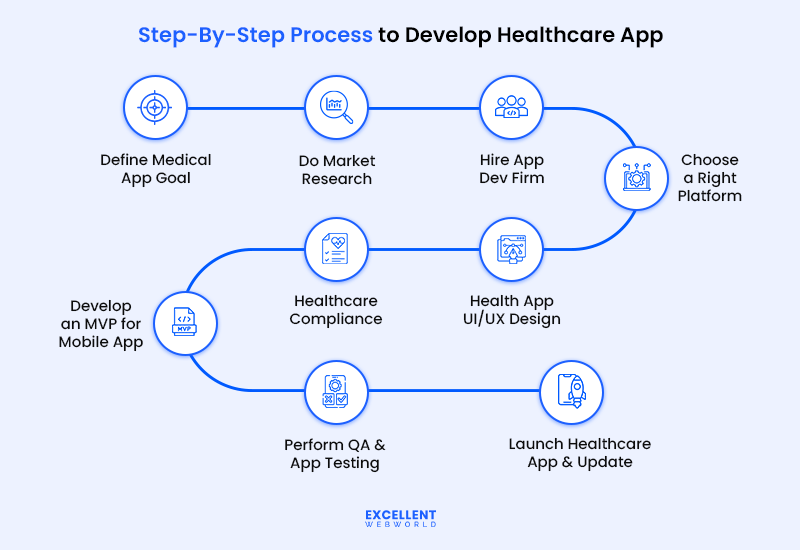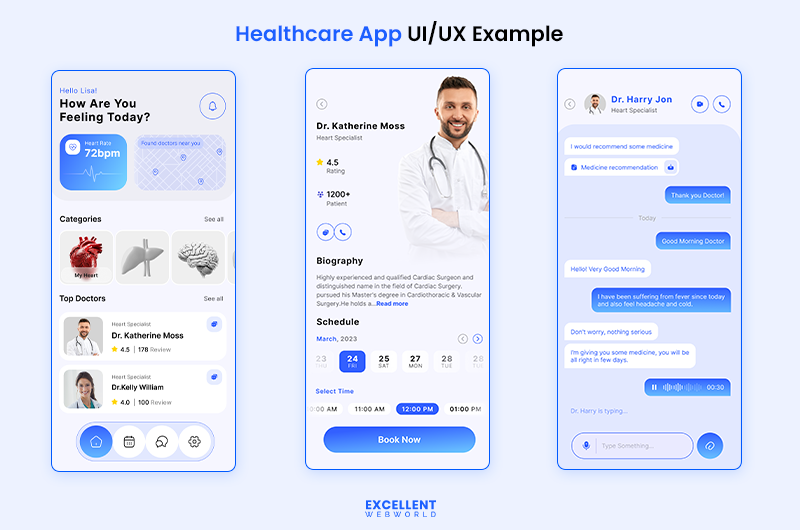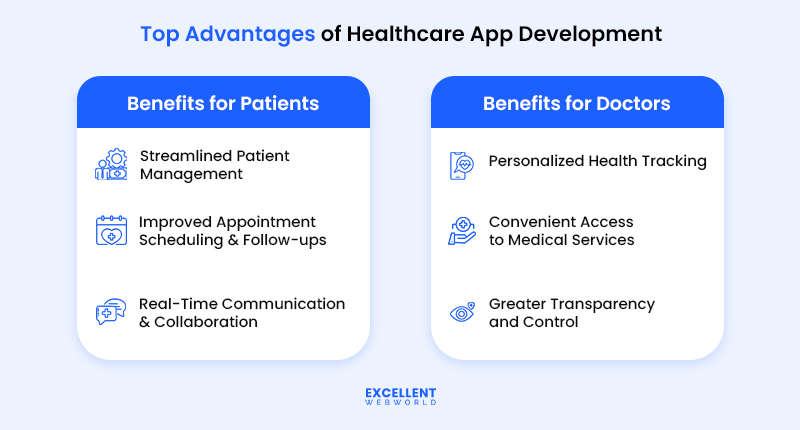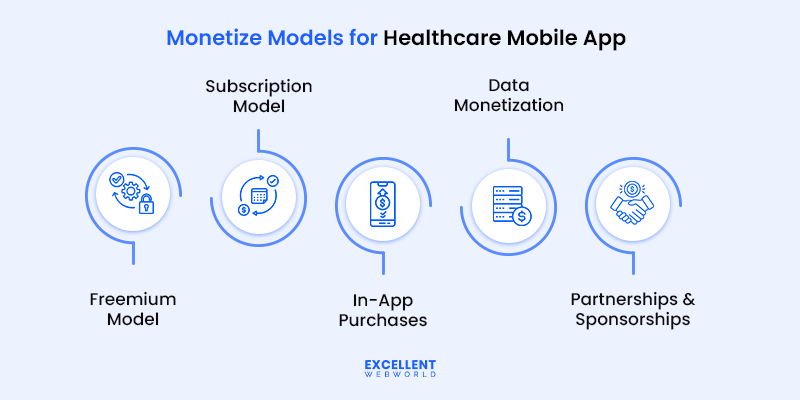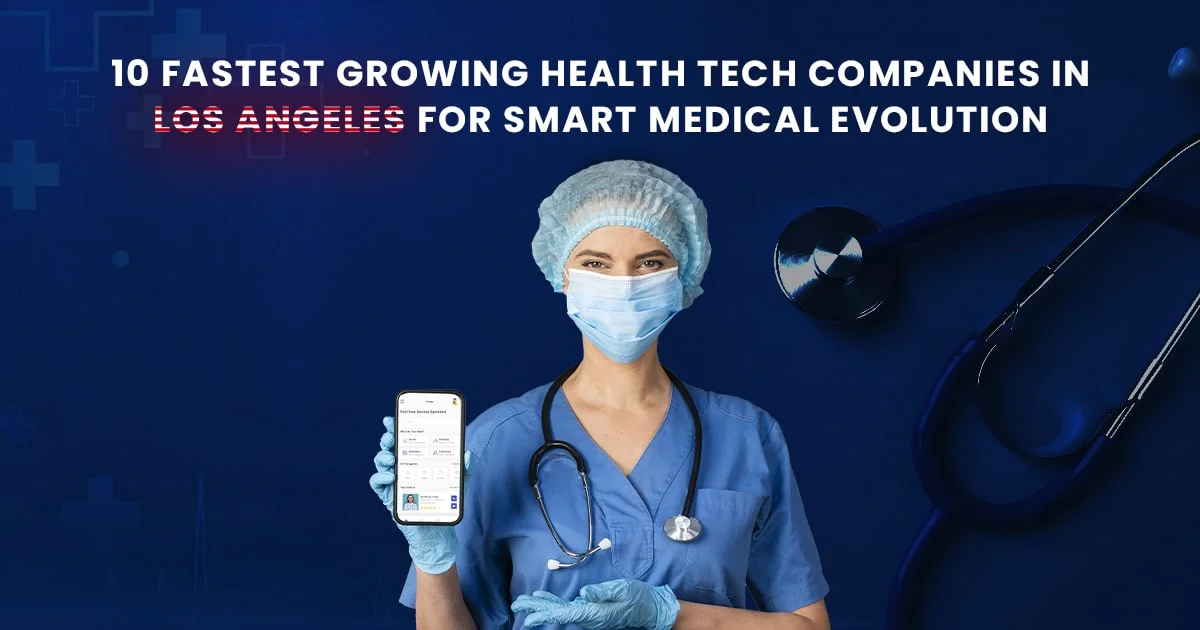
Summary
In this healthcare app development guide, we will cover everything right from the importance of building a healthcare app to its development process, deployment cost, monetization, and types of healthcare app. Keep reading the article! We’re sure you will find something really valuable for your business or startup.
Like every other comfort, such as food delivery or fintech, people want healthcare to be an easily accessible, seamless, and personalized experience. From on-demand consultations to AI-powered diagnostics, the healthcare app businesses are all about opportunities.
The global healthcare IT market is projected to reach USD 834.45 billion by 2029, growing at a CAGR of 14.7% (Source: MarketsandMarkets). Even more telling, a survey mentions that 75% of patients are open to using health-based apps.
This level of market growth justifies that healthcare is no longer a space reserved for hospitals or legacy providers. It’s open territory for tech-driven innovation, and the ones who move now will shape the future of care delivery, patient engagement, and digital health experiences. If you’re not building in this space, you’re leaving value, relevance, and revenue on the table.
With strict regulations and complex data privacy standards, building a healthcare app isn’t easy. But don’t worry! From identifying real market needs to launching a compliant, scalable, and patient-first solution, this healthcare app development guide will cover everything that is right for your business.
What is Healthcare App Development?
Healthcare apps are software programs for mobile devices designed to process health-related data and provide convenience for healthcare professionals and patients. With the features of medical information, appointment scheduling, virtual check-ups, and health tracking, the healthcare app makes functions easy.
Moreover, healthcare app development with AI technology enhances patient engagement by implementing real-time communication between doctors and patients and personalizing health monitoring.
What Are the Types of Healthcare Apps?
There are various types of healthcare apps that can be developed to streamline healthcare industry operations and establish ease of health tracking for patients and health-conscious people. Let’s see the different types of healthcare apps with their prominent examples to better understand:
Healthcare Apps for Providers
Healthcare Apps for Patients
How to Develop a Healthcare App? [9 Simplified Steps]
Let’s discuss how to build a healthcare mobile app in nine easy steps. This mobile application development process starts with the ideation of the problems and covers everything till the successful deployment of the healthcare or medical app.
Step 1: Define the Healthcare App Motive (App’s Goal)
Identify the specific problems or pain points faced by users in the healthcare industry and the requirements to understand their exact needs. Evaluate how your healthcare app can solve the issues effectively and determine its core focus, whether it is for doctor’s appointments, managing diabetes, tracking health data, or addressing other health concerns.
Considering AI in the planning phase can play a crucial role by analyzing patient behavior, healthcare trends, and feedback data to understand deeper insights. AI-driven analytics helps you prioritize features users are actually looking for, personalize care experiences, and even forecast future requirements based on usage patterns.
In clear words, defining an app’s goal is all about ensuring that it matches user expectations and achieves its primary purpose. AI is helping to make all decisions smarter, faster, and more user-centric.
Step 2: Prioritize Market Research
Conduct thorough industry research to find out the data of competitors and gaps that can be filled by your app. Utilize this market information to define different features and functionality that will make your app stand out from the competition.
Incorporate AI-driven research tools to analyze vast datasets for your next healthcare solution. From patient reviews to app store feedback, discover unmet needs, patterns, and innovation possibilities faster and more accurately than any other manual methods. AI can help map out competitor strengths and weaknesses, spot the exact feature gaps, and even predict which functionalities are gaining actual traction in the market.
Put efforts into collecting the data-driven insights on the target audience’s specific needs and behaviors. Collect info from patients, doctors, and caregivers to make sure your app is serving what they actually want. Match the emerging healthcare trends like AI chatbots and wearable technology for your app to keep it relevant and innovative in this highly evolving market.
Step 3: Hire a Healthcare Mobile App Development Company
Always prioritize a healthcare app developer team with a strong product mindset and its scalability from a mobile app development company you hire. Build a team of skilled business analysts, expert UI/UX designers, and professional app developers that help you craft a future-ready healthcare domain app. A long-term collaboration and high employee retention are signs of a good development company, which ensures consistency and expertise throughout the development cycle.
Pro Tip: Hire an AI-driven software development company like Excellent Webworld, which has a significant portfolio of developing healthcare apps with a team of proficient developers.
Step 4: Select an Appropriate Platform
Choose a suitable platform for your healthcare app, such as Android, iOS, web, or cross-platform, based on the preferences of your target audience. Many of the old-age patients want online website access, whereas younger app users prefer voice-enabled devices, as per the trend. Customize your platform choices to match the expectations of your intended users.
Android, iOS, or hybrid app development —whichever method you choose will determine the tech stack expertise you need in your team.
May You Want to Read: Android vs. iOS App Development
Step 5: Work On User-friendly UI/UX Design of Healthcare App
The UI/UX of your app is a crucial thing for the success of your business idea. If you thought of an excellent solution for your patients, doctors, or any other health professionals, but they find difficulty using your app, then it doesn’t work at all. You need to hire expert UI/UX designers who have your industry experience and understand the user perspective of using an app.
Moreover, make sure your UI is compatible with different screen sizes to satisfy a large audience and offer a seamless user experience.
Step 6: Ensure Healthcare Compliance
Healthcare apps consist of private data processing regarding users’ profile information, contact information, health data, etc., which needs protection under privacy concerns. Make sure to assign different user roles to allow controlled access so that only authorized personnel can view it.
Integrate strong data encryption for developing secure storage and transferring personal health info while preventing data redundancy throughout the various servers, which safeguards against loss. Additionally, you can use compliance-driven tools to match all the healthcare regulations and develop a HIPAA-compliant app with unique features.
Step 7: Develop an MVP for Healthcare Mobile App
Build a Minimum Viable Product (MVP) to test your healthcare app’s core features and functionality before investing in full-fledged development. You can develop a minimum viable version of your app and test it with real-world users and make changes accordingly based on the feedback received from them.
Moreover, you can demonstrate your healthcare app demand and capabilities to attract investors. This way, you can easily achieve a successful market launch, probably with zero errors.
Step 8: Perform QA and App Testing
Never skip the part of QA and testing; thoroughly test your healthcare mobile app before deployment to ensure a stable and secure user experience. Continuously monitor and update your app to provide ongoing support and improvements to your users.
A number of tests are carried out before the final deployment of the application. Some of them are functional and non-functional testing, compatibility testing, security testing, user acceptance testing, and more. You can leverage usability testing tools to ensure a better user experience.
Prioritize security, ensure compliance with the industry guidelines & policies, and verify Protected Health Information (PHI) and Personally Identifiable Information (PII). Once all the bugs are decoded, the app is ready for the final deployment.
Step 9: Launch Healthcare App and Update
After you solve all the bugs and errors in the final testing and iteration, launch your healthcare mobile app for real-world users and keep the practice of continuous monitoring within your hired team. Developing a health app is a one-time process; ongoing maintenance and regular upgrades are necessary to ensure long-term business success.
Collaborating with a top mobile app development company like Excellent Webworld offers post-deployment app maintenance support services for your health app. Adapting this privilege on a consistent basis keeps your app running and updated as per the latest trends, which leads to customer loyalty and retention.
***Please note that the above-listed pointers are generic for health sector apps; you can pick only those that suit your healthcare app niche.
What is the Smart Use of AI in Healthcare App Development?
Implementing artificial intelligence in app development helps with advanced features such as predicting health risks, developing the transcription of medical documents, and end-to-end drug discovery. Statistics of AI in healthcare actually define that people are adopting AI and revolutionizing the healthcare sector on a grand level. With the use of AI and ML algorithms, early diagnosis, finding health patterns, and analyzing health data-like tasks can be done in cutting-edge healthcare solutions.
AI Applications in Healthcare Apps
There are many use cases of AI in the healthcare industry; to embrace it efficiently, you need to hire the right tech partner, like Excellent Webworld, which has a team of experts that provides productive AI development services. Let’s learn some of the popular applications of AI for healthcare solutions.
What are the Top Benefits of Healthcare Application Development?
Entrepreneurs are revolutionizing care delivery by developing a healthcare app with the industry’s top healthcare app developers, which leads to accessibility and streamlined workflows, improved communications, and many more benefits. Medical device development empowers both doctors and patients with real-time data and personalized health solutions.
Let’s explore the top advantages of healthcare or medical application development.
1. Healthcare App Benefits for Doctors and Healthcare Professionals
Here are the most common benefits experienced by doctors and other professionals who work in the healthcare sector.
a) Streamlined Patient Management
Medical history, prescriptions, lab results, and everything related to patient data can be centralized in the healthcare app. This way, it becomes super convenient for doctors to access and update records in real time.
b) Improved Appointment Scheduling & Follow-ups
Healthcare professionals can reduce no-shows and manage their daily workflow efficiently, as the automated appointment systems and in-app reminders work properly. Some medical apps also provide integrated teleconsultation features to assist remote patients seamlessly.
c) Real-Time Communication & Collaboration
Sometimes when doctors need a second opinion to ensure accurate results, a healthcare app can give secure access to chat or video consult with colleagues or specialists. This collaborative approach improves care quality, especially in complex or emergency cases.
2. Healthcare App Benefits for Patients and General Users
Let’s discuss the key advantages of using a healthcare app by a patient or any other general user.
a) Personalized Health Tracking
Many medical application development works on serving features like symptom checkers, fitness tracking, and medication reminders, allowing users to take charge of their lifestyle and well-being proactively. Data-driven details also benefit in performing early diagnosis and lifestyle management.
b) Convenient Access to Medical Services
A healthcare app for patients is like visiting a clinic at their fingertips. Medical services such as appointment scheduling, video consultations, and ordering prescriptions can be done from an app. No more waiting rooms or long commutes.
c) Greater Transparency and Control
Patients can view their medical records, track progress, and even compare treatment options or providers. Mostly, building EHR systems helps you offer these features to your patients, which leads to transparency, builds trust, and empowers informed decision-making.
What Are the Healthcare App Compliances? [Risk & Regulations to Consider]
Let’s discuss key compliance related to the health sector that is mandatory for healthcare app development, which ensures risk and regulations.
How to Monetize a Healthcare Mobile App?
It’s essential to carefully evaluate and choose the monetization strategy for your marketplace business model that aligns with your app’s value proposition, user base, and market dynamics. Consider balancing revenue generation with providing a valuable and user-friendly experience to ensure long-term success.
1. Freemium Model
Offer a basic version of your app for free, while charging for premium features or advanced functionalities. These allow users to experience the app’s core value and encourage them to upgrade for additional benefits.
2. Subscription Model
Implement a subscription-based pricing structure, where users pay a recurring fee to access the full range of app features or content. This model can provide a steady revenue stream and ongoing engagement with users.
3. In-App Purchases
Offer additional services, content, or virtual goods within the app that users can purchase. This could include premium health content, personalized consultations, or access to specialized features.
4. Data Monetization
If your app collects anonymized and aggregated data. Then, you can explore partnerships with researchers, healthcare organizations, or pharmaceutical companies who may be interested in purchasing insights or data trends derived from your app’s user data storage (ensuring privacy and legal compliance).
5. Partnerships and Sponsorships
Collaborate with healthcare providers, clinics, or pharmaceutical companies to promote their services or products within your app. These can include displaying relevant advertisements or featuring sponsored content.
What is the Healthcare App Development Cost?
There are many factors, such as app complexity, advanced features, development team location, additional app maintenance cost etc., that can affect the total budget of healthcare app development. The following table provides the cost estimation based on the healthcare mobile app complexity.
| App Type | Features Type | Estimated Cost |
|---|---|---|
| Basic MVP | Only Core Features and Functionality | USD 15,000* to 25,000 |
| Mid-Level App | Moderate Functionality, Such as Appointment Scheduling, Virtual Meetings, Health Tracking, etc. | USD 30,000 to 60,000 |
| Advanced App | Advanced Features Based On AI Implementations and Complex API Integrations, Such as Voice-Search, 24/7 Chatbot Support, etc. | USD 70,000 to 130,000+ |
***Please Note:
Final Words: Transform Healthcare With Efficient App Development
As healthcare apps are no longer a luxury business idea, they have become a necessity in the fast-moving lifestyle of today’s generation. With features like appointment scheduling, virtual consulting, improved care coordination, or reduced operational costs, a great healthcare app can create a massive impact on patients, health professionals, clinical outcomes, and business growth.
Medical devices are about empowering users to take charge of their well-being. You just need a good tech partner who makes efforts to make your healthcare business idea a reality. As a top-notch AI-driven healthcare app development company, our team at Excellent Webworld builds secure, scalable, and user-friendly healthcare applications.
With years of experience in HIPAA-compliant development, AI integration, and custom telehealth solutions, we help startups, clinics, and enterprises turn bold healthcare ideas into high-performing digital products. Let’s build your next-gen healthcare solution together to thrive tremendously.
FAQs
Healthcare app development costs range from USD 15,000 to 150,000+, depending on features, complexity, and compliance needs.
A basic MVP can take 3 to 5 weeks, while a fully featured app development may take 3 to 9 months or more, based on the app complexity.
Absolutely. AI enhances symptom checking, diagnostics, patient engagement, and admin automation. Team of professional AI integration developers at Excellent Webworld can help you build an AI-based healthcare solution that ensures your business success.

Article By
Mayur Panchal is the CTO of Excellent Webworld. With his skills and expertise, He stays updated with industry trends and utilizes his technical expertise to address problems faced by entrepreneurs and startup owners.

